Cross-Cultural Management in Business: A Report on John's Mistakes
VerifiedAdded on 2022/12/29
|10
|2537
|37
Report
AI Summary
This report delves into the complexities of cross-cultural management in business, using a case study to analyze the mistakes made by a manager named John when implementing a training program across different cultural contexts. The report explores the concept of cross-culture, its significance, and impact on businesses, highlighting how cultural differences in work ethics, communication styles, and technological advancements can lead to failures. It examines intercultural theories such as intercultural communication theory and the iceberg cultural theory, evaluating cross-cultural problems and offering advice for managers. The report further discusses management behaviors for navigating cultural differences, along with cross-cultural challenges in joint ventures and mergers, concluding with key insights on how to avoid such challenges and ensure successful international business operations. This report is a valuable resource for understanding and addressing cross-cultural issues in the business world.
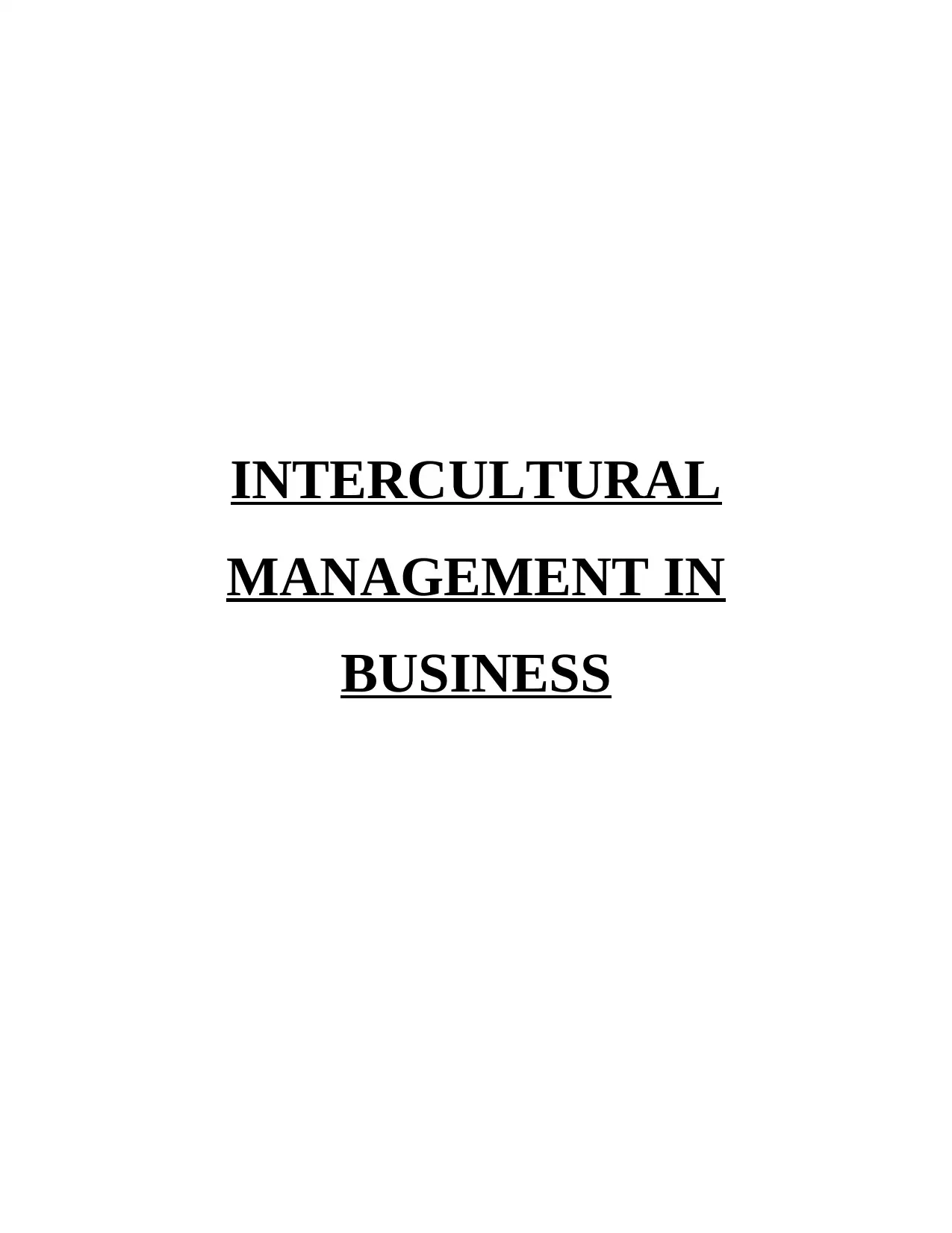
INTERCULTURAL
MANAGEMENT IN
BUSINESS
MANAGEMENT IN
BUSINESS
Paraphrase This Document
Need a fresh take? Get an instant paraphrase of this document with our AI Paraphraser
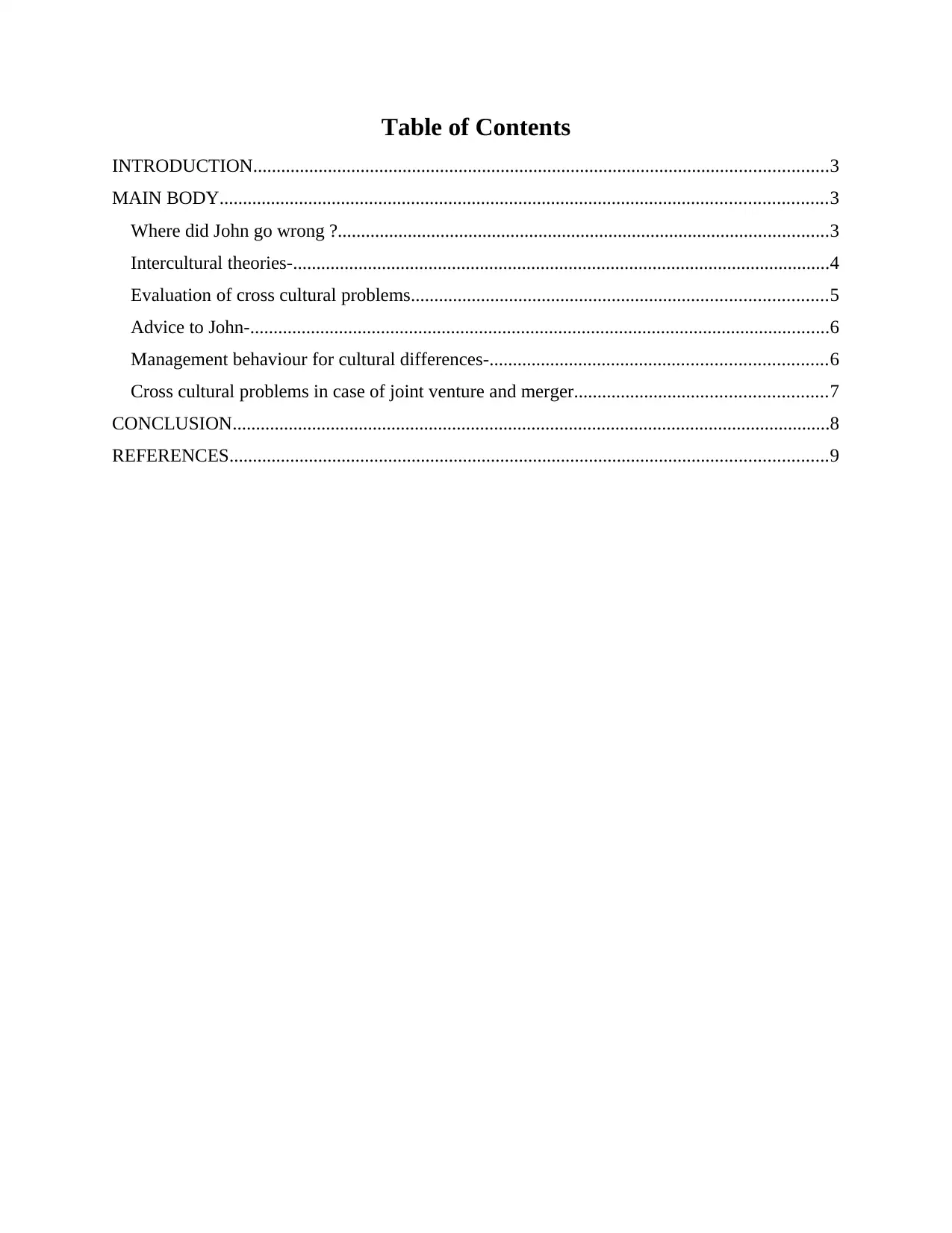
Table of Contents
INTRODUCTION...........................................................................................................................3
MAIN BODY..................................................................................................................................3
Where did John go wrong ?.........................................................................................................3
Intercultural theories-...................................................................................................................4
Evaluation of cross cultural problems.........................................................................................5
Advice to John-............................................................................................................................6
Management behaviour for cultural differences-........................................................................6
Cross cultural problems in case of joint venture and merger......................................................7
CONCLUSION................................................................................................................................8
REFERENCES................................................................................................................................9
INTRODUCTION...........................................................................................................................3
MAIN BODY..................................................................................................................................3
Where did John go wrong ?.........................................................................................................3
Intercultural theories-...................................................................................................................4
Evaluation of cross cultural problems.........................................................................................5
Advice to John-............................................................................................................................6
Management behaviour for cultural differences-........................................................................6
Cross cultural problems in case of joint venture and merger......................................................7
CONCLUSION................................................................................................................................8
REFERENCES................................................................................................................................9

⊘ This is a preview!⊘
Do you want full access?
Subscribe today to unlock all pages.

Trusted by 1+ million students worldwide
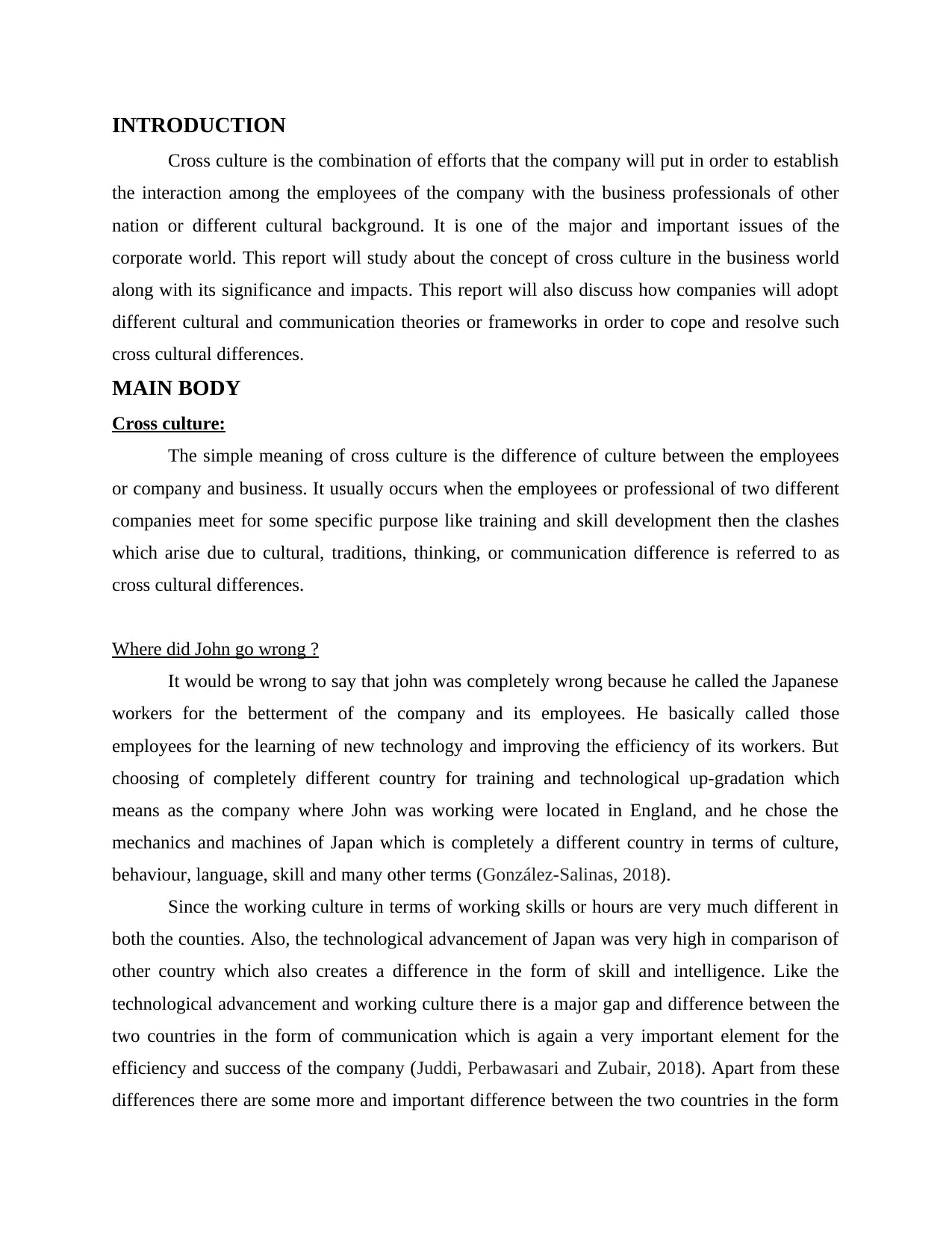
INTRODUCTION
Cross culture is the combination of efforts that the company will put in order to establish
the interaction among the employees of the company with the business professionals of other
nation or different cultural background. It is one of the major and important issues of the
corporate world. This report will study about the concept of cross culture in the business world
along with its significance and impacts. This report will also discuss how companies will adopt
different cultural and communication theories or frameworks in order to cope and resolve such
cross cultural differences.
MAIN BODY
Cross culture:
The simple meaning of cross culture is the difference of culture between the employees
or company and business. It usually occurs when the employees or professional of two different
companies meet for some specific purpose like training and skill development then the clashes
which arise due to cultural, traditions, thinking, or communication difference is referred to as
cross cultural differences.
Where did John go wrong ?
It would be wrong to say that john was completely wrong because he called the Japanese
workers for the betterment of the company and its employees. He basically called those
employees for the learning of new technology and improving the efficiency of its workers. But
choosing of completely different country for training and technological up-gradation which
means as the company where John was working were located in England, and he chose the
mechanics and machines of Japan which is completely a different country in terms of culture,
behaviour, language, skill and many other terms (González-Salinas, 2018).
Since the working culture in terms of working skills or hours are very much different in
both the counties. Also, the technological advancement of Japan was very high in comparison of
other country which also creates a difference in the form of skill and intelligence. Like the
technological advancement and working culture there is a major gap and difference between the
two countries in the form of communication which is again a very important element for the
efficiency and success of the company (Juddi, Perbawasari and Zubair, 2018). Apart from these
differences there are some more and important difference between the two countries in the form
Cross culture is the combination of efforts that the company will put in order to establish
the interaction among the employees of the company with the business professionals of other
nation or different cultural background. It is one of the major and important issues of the
corporate world. This report will study about the concept of cross culture in the business world
along with its significance and impacts. This report will also discuss how companies will adopt
different cultural and communication theories or frameworks in order to cope and resolve such
cross cultural differences.
MAIN BODY
Cross culture:
The simple meaning of cross culture is the difference of culture between the employees
or company and business. It usually occurs when the employees or professional of two different
companies meet for some specific purpose like training and skill development then the clashes
which arise due to cultural, traditions, thinking, or communication difference is referred to as
cross cultural differences.
Where did John go wrong ?
It would be wrong to say that john was completely wrong because he called the Japanese
workers for the betterment of the company and its employees. He basically called those
employees for the learning of new technology and improving the efficiency of its workers. But
choosing of completely different country for training and technological up-gradation which
means as the company where John was working were located in England, and he chose the
mechanics and machines of Japan which is completely a different country in terms of culture,
behaviour, language, skill and many other terms (González-Salinas, 2018).
Since the working culture in terms of working skills or hours are very much different in
both the counties. Also, the technological advancement of Japan was very high in comparison of
other country which also creates a difference in the form of skill and intelligence. Like the
technological advancement and working culture there is a major gap and difference between the
two countries in the form of communication which is again a very important element for the
efficiency and success of the company (Juddi, Perbawasari and Zubair, 2018). Apart from these
differences there are some more and important difference between the two countries in the form
Paraphrase This Document
Need a fresh take? Get an instant paraphrase of this document with our AI Paraphraser
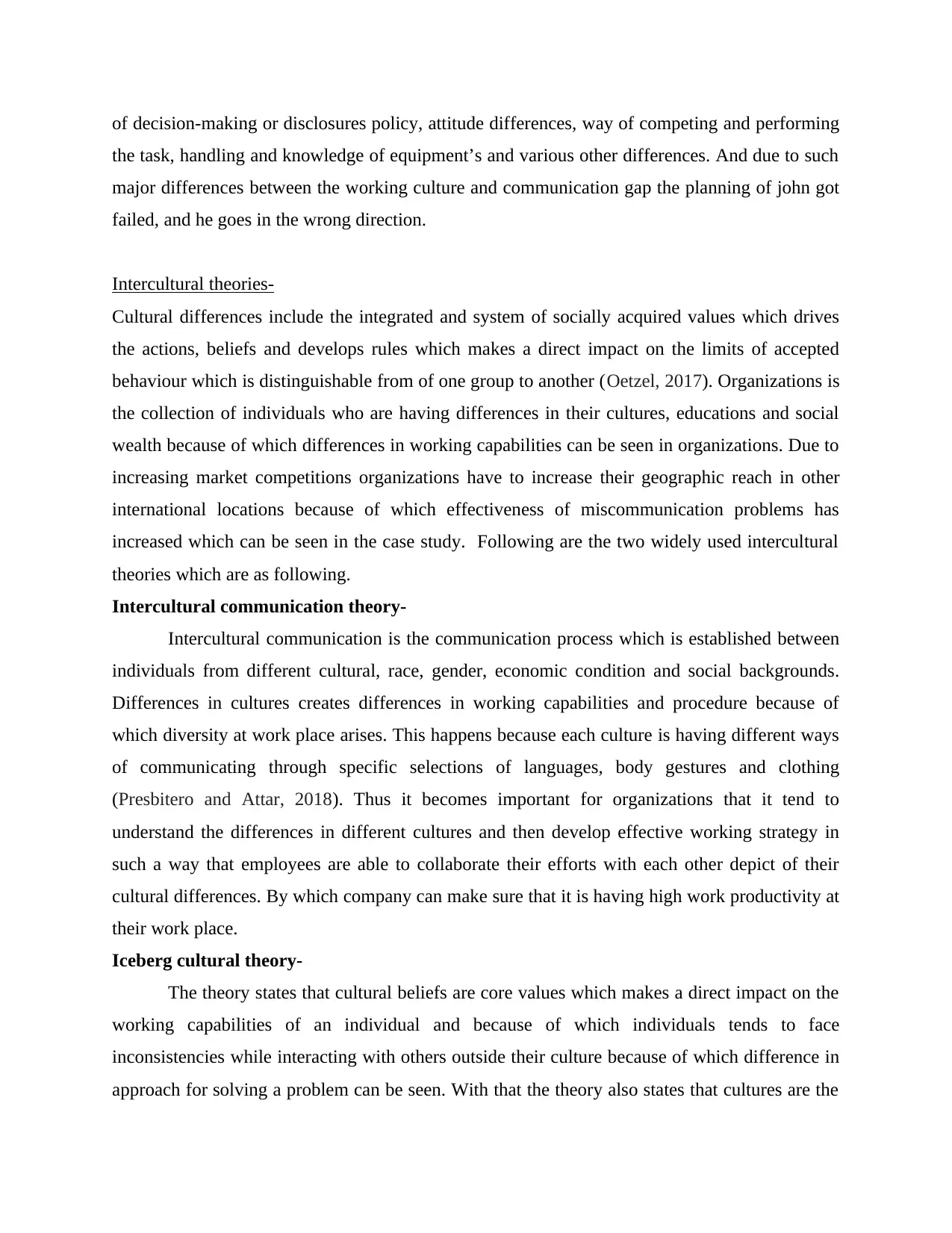
of decision-making or disclosures policy, attitude differences, way of competing and performing
the task, handling and knowledge of equipment’s and various other differences. And due to such
major differences between the working culture and communication gap the planning of john got
failed, and he goes in the wrong direction.
Intercultural theories-
Cultural differences include the integrated and system of socially acquired values which drives
the actions, beliefs and develops rules which makes a direct impact on the limits of accepted
behaviour which is distinguishable from of one group to another (Oetzel, 2017). Organizations is
the collection of individuals who are having differences in their cultures, educations and social
wealth because of which differences in working capabilities can be seen in organizations. Due to
increasing market competitions organizations have to increase their geographic reach in other
international locations because of which effectiveness of miscommunication problems has
increased which can be seen in the case study. Following are the two widely used intercultural
theories which are as following.
Intercultural communication theory-
Intercultural communication is the communication process which is established between
individuals from different cultural, race, gender, economic condition and social backgrounds.
Differences in cultures creates differences in working capabilities and procedure because of
which diversity at work place arises. This happens because each culture is having different ways
of communicating through specific selections of languages, body gestures and clothing
(Presbitero and Attar, 2018). Thus it becomes important for organizations that it tend to
understand the differences in different cultures and then develop effective working strategy in
such a way that employees are able to collaborate their efforts with each other depict of their
cultural differences. By which company can make sure that it is having high work productivity at
their work place.
Iceberg cultural theory-
The theory states that cultural beliefs are core values which makes a direct impact on the
working capabilities of an individual and because of which individuals tends to face
inconsistencies while interacting with others outside their culture because of which difference in
approach for solving a problem can be seen. With that the theory also states that cultures are the
the task, handling and knowledge of equipment’s and various other differences. And due to such
major differences between the working culture and communication gap the planning of john got
failed, and he goes in the wrong direction.
Intercultural theories-
Cultural differences include the integrated and system of socially acquired values which drives
the actions, beliefs and develops rules which makes a direct impact on the limits of accepted
behaviour which is distinguishable from of one group to another (Oetzel, 2017). Organizations is
the collection of individuals who are having differences in their cultures, educations and social
wealth because of which differences in working capabilities can be seen in organizations. Due to
increasing market competitions organizations have to increase their geographic reach in other
international locations because of which effectiveness of miscommunication problems has
increased which can be seen in the case study. Following are the two widely used intercultural
theories which are as following.
Intercultural communication theory-
Intercultural communication is the communication process which is established between
individuals from different cultural, race, gender, economic condition and social backgrounds.
Differences in cultures creates differences in working capabilities and procedure because of
which diversity at work place arises. This happens because each culture is having different ways
of communicating through specific selections of languages, body gestures and clothing
(Presbitero and Attar, 2018). Thus it becomes important for organizations that it tend to
understand the differences in different cultures and then develop effective working strategy in
such a way that employees are able to collaborate their efforts with each other depict of their
cultural differences. By which company can make sure that it is having high work productivity at
their work place.
Iceberg cultural theory-
The theory states that cultural beliefs are core values which makes a direct impact on the
working capabilities of an individual and because of which individuals tends to face
inconsistencies while interacting with others outside their culture because of which difference in
approach for solving a problem can be seen. With that the theory also states that cultures are the
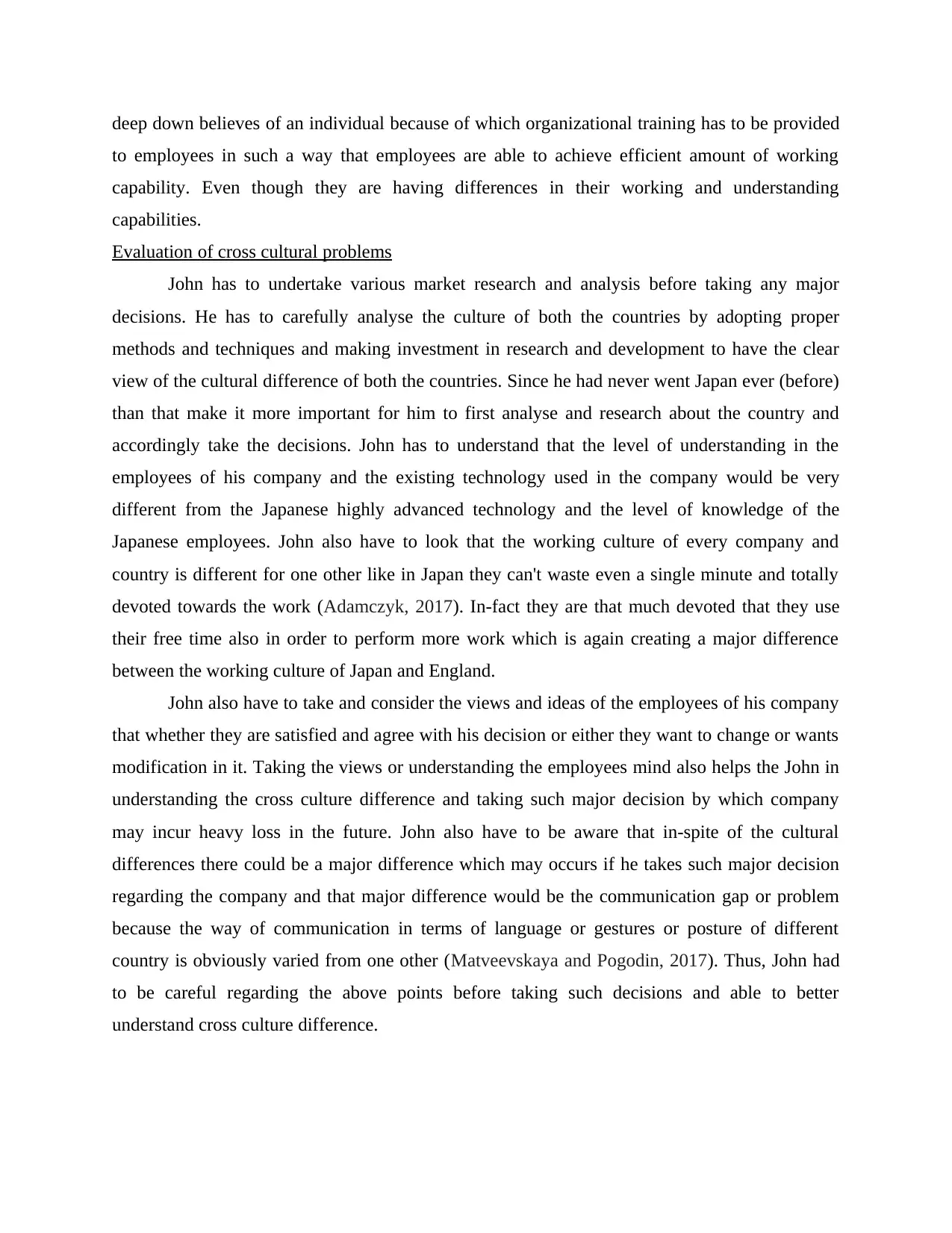
deep down believes of an individual because of which organizational training has to be provided
to employees in such a way that employees are able to achieve efficient amount of working
capability. Even though they are having differences in their working and understanding
capabilities.
Evaluation of cross cultural problems
John has to undertake various market research and analysis before taking any major
decisions. He has to carefully analyse the culture of both the countries by adopting proper
methods and techniques and making investment in research and development to have the clear
view of the cultural difference of both the countries. Since he had never went Japan ever (before)
than that make it more important for him to first analyse and research about the country and
accordingly take the decisions. John has to understand that the level of understanding in the
employees of his company and the existing technology used in the company would be very
different from the Japanese highly advanced technology and the level of knowledge of the
Japanese employees. John also have to look that the working culture of every company and
country is different for one other like in Japan they can't waste even a single minute and totally
devoted towards the work (Adamczyk, 2017). In-fact they are that much devoted that they use
their free time also in order to perform more work which is again creating a major difference
between the working culture of Japan and England.
John also have to take and consider the views and ideas of the employees of his company
that whether they are satisfied and agree with his decision or either they want to change or wants
modification in it. Taking the views or understanding the employees mind also helps the John in
understanding the cross culture difference and taking such major decision by which company
may incur heavy loss in the future. John also have to be aware that in-spite of the cultural
differences there could be a major difference which may occurs if he takes such major decision
regarding the company and that major difference would be the communication gap or problem
because the way of communication in terms of language or gestures or posture of different
country is obviously varied from one other (Matveevskaya and Pogodin, 2017). Thus, John had
to be careful regarding the above points before taking such decisions and able to better
understand cross culture difference.
to employees in such a way that employees are able to achieve efficient amount of working
capability. Even though they are having differences in their working and understanding
capabilities.
Evaluation of cross cultural problems
John has to undertake various market research and analysis before taking any major
decisions. He has to carefully analyse the culture of both the countries by adopting proper
methods and techniques and making investment in research and development to have the clear
view of the cultural difference of both the countries. Since he had never went Japan ever (before)
than that make it more important for him to first analyse and research about the country and
accordingly take the decisions. John has to understand that the level of understanding in the
employees of his company and the existing technology used in the company would be very
different from the Japanese highly advanced technology and the level of knowledge of the
Japanese employees. John also have to look that the working culture of every company and
country is different for one other like in Japan they can't waste even a single minute and totally
devoted towards the work (Adamczyk, 2017). In-fact they are that much devoted that they use
their free time also in order to perform more work which is again creating a major difference
between the working culture of Japan and England.
John also have to take and consider the views and ideas of the employees of his company
that whether they are satisfied and agree with his decision or either they want to change or wants
modification in it. Taking the views or understanding the employees mind also helps the John in
understanding the cross culture difference and taking such major decision by which company
may incur heavy loss in the future. John also have to be aware that in-spite of the cultural
differences there could be a major difference which may occurs if he takes such major decision
regarding the company and that major difference would be the communication gap or problem
because the way of communication in terms of language or gestures or posture of different
country is obviously varied from one other (Matveevskaya and Pogodin, 2017). Thus, John had
to be careful regarding the above points before taking such decisions and able to better
understand cross culture difference.
⊘ This is a preview!⊘
Do you want full access?
Subscribe today to unlock all pages.

Trusted by 1+ million students worldwide
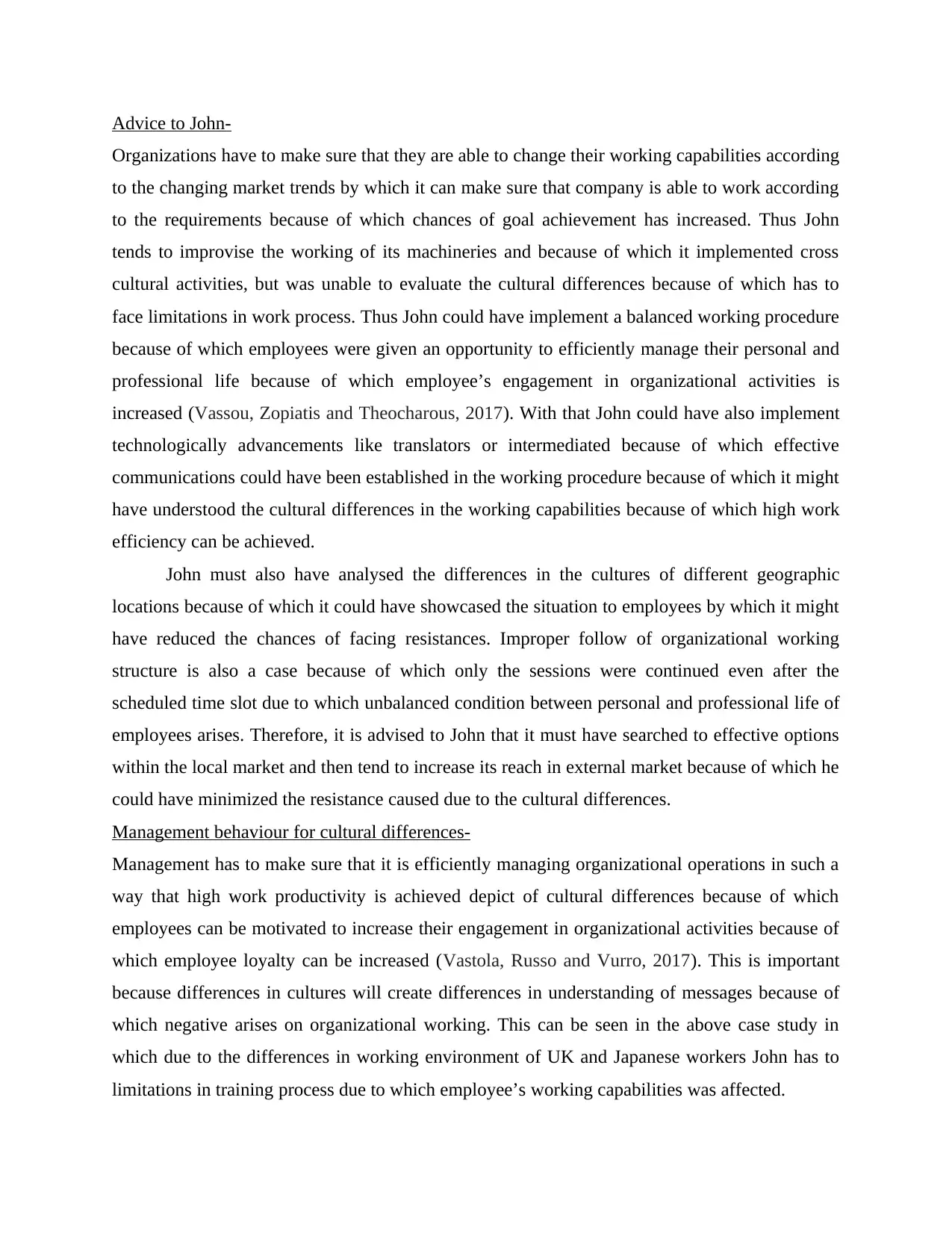
Advice to John-
Organizations have to make sure that they are able to change their working capabilities according
to the changing market trends by which it can make sure that company is able to work according
to the requirements because of which chances of goal achievement has increased. Thus John
tends to improvise the working of its machineries and because of which it implemented cross
cultural activities, but was unable to evaluate the cultural differences because of which has to
face limitations in work process. Thus John could have implement a balanced working procedure
because of which employees were given an opportunity to efficiently manage their personal and
professional life because of which employee’s engagement in organizational activities is
increased (Vassou, Zopiatis and Theocharous, 2017). With that John could have also implement
technologically advancements like translators or intermediated because of which effective
communications could have been established in the working procedure because of which it might
have understood the cultural differences in the working capabilities because of which high work
efficiency can be achieved.
John must also have analysed the differences in the cultures of different geographic
locations because of which it could have showcased the situation to employees by which it might
have reduced the chances of facing resistances. Improper follow of organizational working
structure is also a case because of which only the sessions were continued even after the
scheduled time slot due to which unbalanced condition between personal and professional life of
employees arises. Therefore, it is advised to John that it must have searched to effective options
within the local market and then tend to increase its reach in external market because of which he
could have minimized the resistance caused due to the cultural differences.
Management behaviour for cultural differences-
Management has to make sure that it is efficiently managing organizational operations in such a
way that high work productivity is achieved depict of cultural differences because of which
employees can be motivated to increase their engagement in organizational activities because of
which employee loyalty can be increased (Vastola, Russo and Vurro, 2017). This is important
because differences in cultures will create differences in understanding of messages because of
which negative arises on organizational working. This can be seen in the above case study in
which due to the differences in working environment of UK and Japanese workers John has to
limitations in training process due to which employee’s working capabilities was affected.
Organizations have to make sure that they are able to change their working capabilities according
to the changing market trends by which it can make sure that company is able to work according
to the requirements because of which chances of goal achievement has increased. Thus John
tends to improvise the working of its machineries and because of which it implemented cross
cultural activities, but was unable to evaluate the cultural differences because of which has to
face limitations in work process. Thus John could have implement a balanced working procedure
because of which employees were given an opportunity to efficiently manage their personal and
professional life because of which employee’s engagement in organizational activities is
increased (Vassou, Zopiatis and Theocharous, 2017). With that John could have also implement
technologically advancements like translators or intermediated because of which effective
communications could have been established in the working procedure because of which it might
have understood the cultural differences in the working capabilities because of which high work
efficiency can be achieved.
John must also have analysed the differences in the cultures of different geographic
locations because of which it could have showcased the situation to employees by which it might
have reduced the chances of facing resistances. Improper follow of organizational working
structure is also a case because of which only the sessions were continued even after the
scheduled time slot due to which unbalanced condition between personal and professional life of
employees arises. Therefore, it is advised to John that it must have searched to effective options
within the local market and then tend to increase its reach in external market because of which he
could have minimized the resistance caused due to the cultural differences.
Management behaviour for cultural differences-
Management has to make sure that it is efficiently managing organizational operations in such a
way that high work productivity is achieved depict of cultural differences because of which
employees can be motivated to increase their engagement in organizational activities because of
which employee loyalty can be increased (Vastola, Russo and Vurro, 2017). This is important
because differences in cultures will create differences in understanding of messages because of
which negative arises on organizational working. This can be seen in the above case study in
which due to the differences in working environment of UK and Japanese workers John has to
limitations in training process due to which employee’s working capabilities was affected.
Paraphrase This Document
Need a fresh take? Get an instant paraphrase of this document with our AI Paraphraser
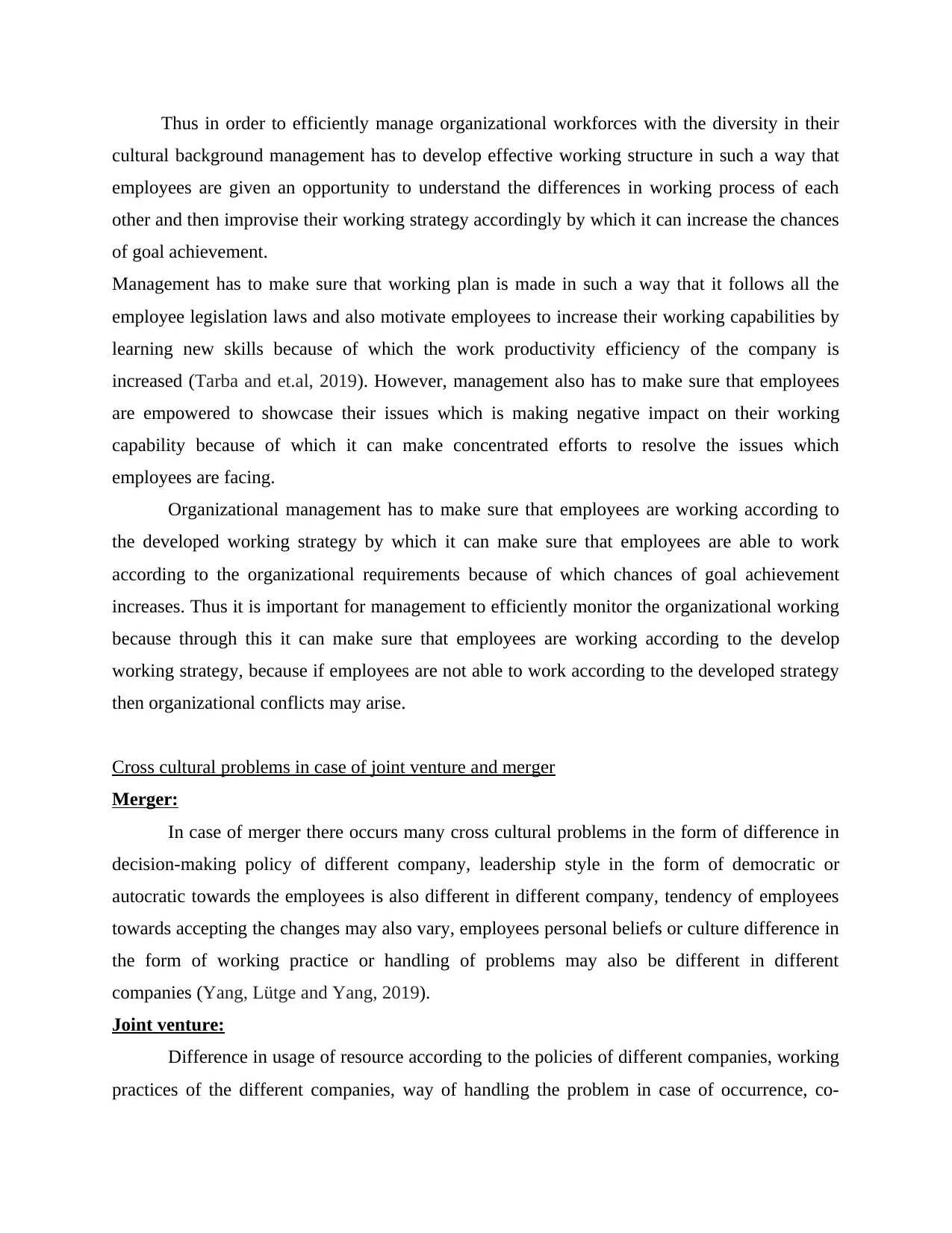
Thus in order to efficiently manage organizational workforces with the diversity in their
cultural background management has to develop effective working structure in such a way that
employees are given an opportunity to understand the differences in working process of each
other and then improvise their working strategy accordingly by which it can increase the chances
of goal achievement.
Management has to make sure that working plan is made in such a way that it follows all the
employee legislation laws and also motivate employees to increase their working capabilities by
learning new skills because of which the work productivity efficiency of the company is
increased (Tarba and et.al, 2019). However, management also has to make sure that employees
are empowered to showcase their issues which is making negative impact on their working
capability because of which it can make concentrated efforts to resolve the issues which
employees are facing.
Organizational management has to make sure that employees are working according to
the developed working strategy by which it can make sure that employees are able to work
according to the organizational requirements because of which chances of goal achievement
increases. Thus it is important for management to efficiently monitor the organizational working
because through this it can make sure that employees are working according to the develop
working strategy, because if employees are not able to work according to the developed strategy
then organizational conflicts may arise.
Cross cultural problems in case of joint venture and merger
Merger:
In case of merger there occurs many cross cultural problems in the form of difference in
decision-making policy of different company, leadership style in the form of democratic or
autocratic towards the employees is also different in different company, tendency of employees
towards accepting the changes may also vary, employees personal beliefs or culture difference in
the form of working practice or handling of problems may also be different in different
companies (Yang, Lütge and Yang, 2019).
Joint venture:
Difference in usage of resource according to the policies of different companies, working
practices of the different companies, way of handling the problem in case of occurrence, co-
cultural background management has to develop effective working structure in such a way that
employees are given an opportunity to understand the differences in working process of each
other and then improvise their working strategy accordingly by which it can increase the chances
of goal achievement.
Management has to make sure that working plan is made in such a way that it follows all the
employee legislation laws and also motivate employees to increase their working capabilities by
learning new skills because of which the work productivity efficiency of the company is
increased (Tarba and et.al, 2019). However, management also has to make sure that employees
are empowered to showcase their issues which is making negative impact on their working
capability because of which it can make concentrated efforts to resolve the issues which
employees are facing.
Organizational management has to make sure that employees are working according to
the developed working strategy by which it can make sure that employees are able to work
according to the organizational requirements because of which chances of goal achievement
increases. Thus it is important for management to efficiently monitor the organizational working
because through this it can make sure that employees are working according to the develop
working strategy, because if employees are not able to work according to the developed strategy
then organizational conflicts may arise.
Cross cultural problems in case of joint venture and merger
Merger:
In case of merger there occurs many cross cultural problems in the form of difference in
decision-making policy of different company, leadership style in the form of democratic or
autocratic towards the employees is also different in different company, tendency of employees
towards accepting the changes may also vary, employees personal beliefs or culture difference in
the form of working practice or handling of problems may also be different in different
companies (Yang, Lütge and Yang, 2019).
Joint venture:
Difference in usage of resource according to the policies of different companies, working
practices of the different companies, way of handling the problem in case of occurrence, co-
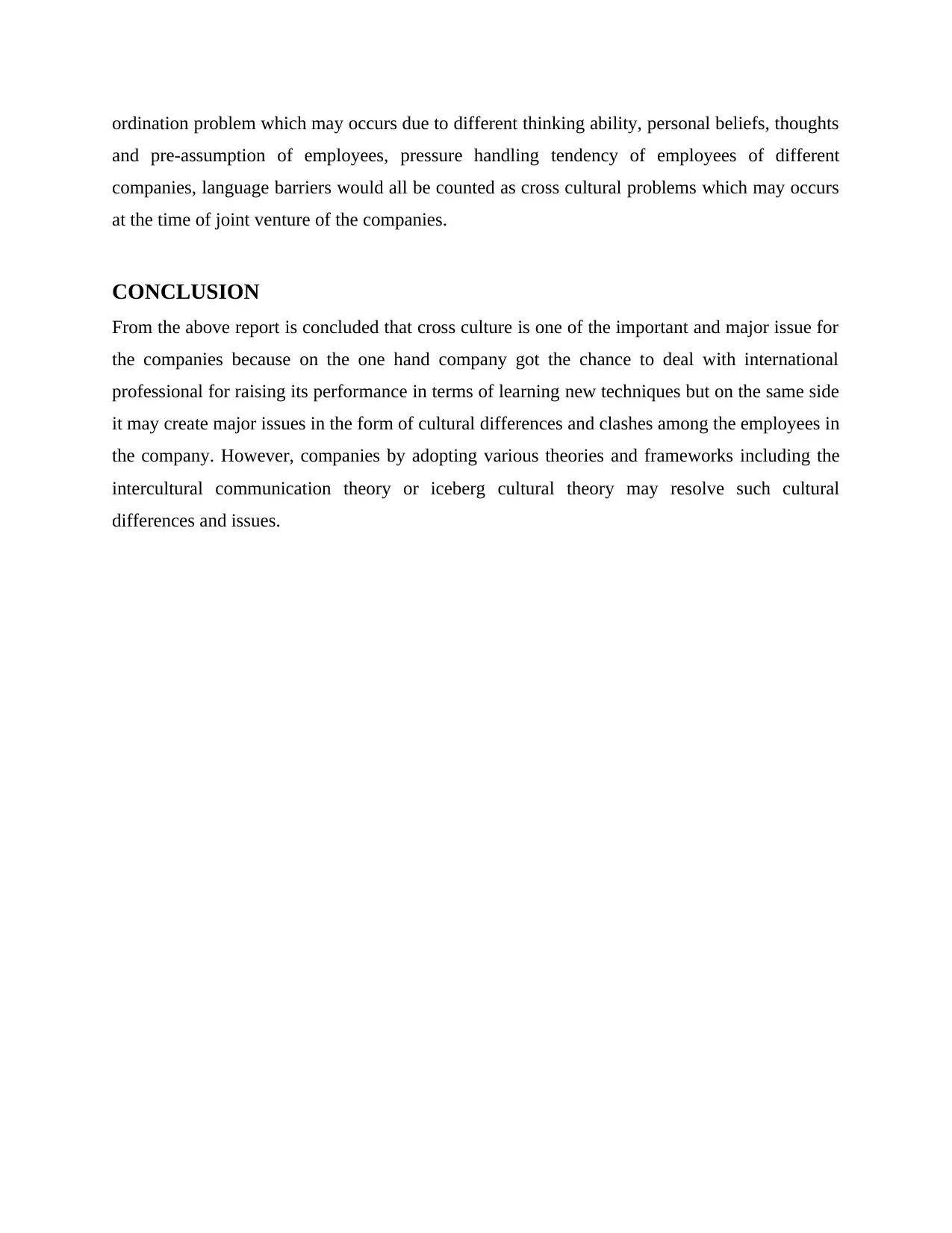
ordination problem which may occurs due to different thinking ability, personal beliefs, thoughts
and pre-assumption of employees, pressure handling tendency of employees of different
companies, language barriers would all be counted as cross cultural problems which may occurs
at the time of joint venture of the companies.
CONCLUSION
From the above report is concluded that cross culture is one of the important and major issue for
the companies because on the one hand company got the chance to deal with international
professional for raising its performance in terms of learning new techniques but on the same side
it may create major issues in the form of cultural differences and clashes among the employees in
the company. However, companies by adopting various theories and frameworks including the
intercultural communication theory or iceberg cultural theory may resolve such cultural
differences and issues.
and pre-assumption of employees, pressure handling tendency of employees of different
companies, language barriers would all be counted as cross cultural problems which may occurs
at the time of joint venture of the companies.
CONCLUSION
From the above report is concluded that cross culture is one of the important and major issue for
the companies because on the one hand company got the chance to deal with international
professional for raising its performance in terms of learning new techniques but on the same side
it may create major issues in the form of cultural differences and clashes among the employees in
the company. However, companies by adopting various theories and frameworks including the
intercultural communication theory or iceberg cultural theory may resolve such cultural
differences and issues.
⊘ This is a preview!⊘
Do you want full access?
Subscribe today to unlock all pages.

Trusted by 1+ million students worldwide
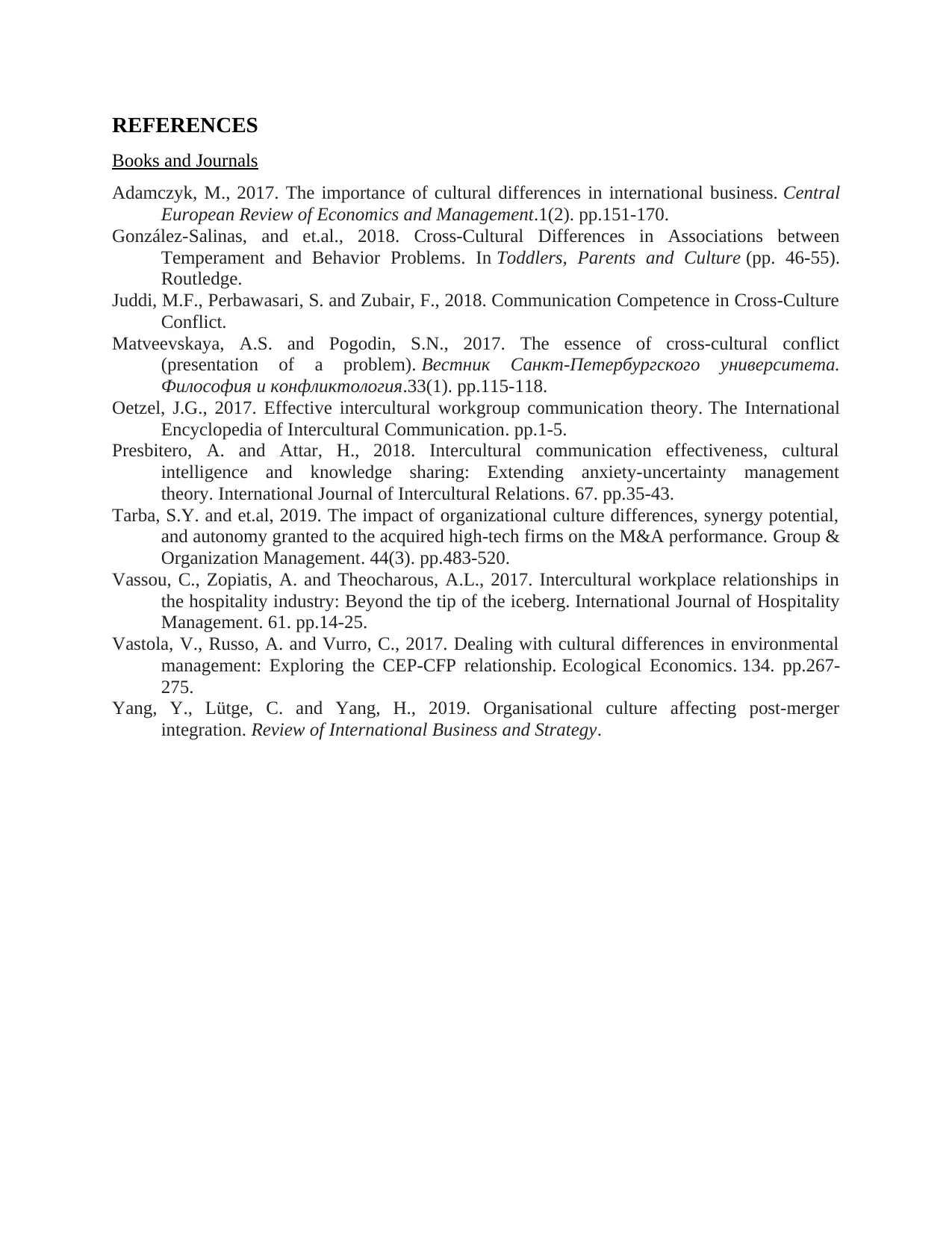
REFERENCES
Books and Journals
Adamczyk, M., 2017. The importance of cultural differences in international business. Central
European Review of Economics and Management.1(2). pp.151-170.
González-Salinas, and et.al., 2018. Cross-Cultural Differences in Associations between
Temperament and Behavior Problems. In Toddlers, Parents and Culture (pp. 46-55).
Routledge.
Juddi, M.F., Perbawasari, S. and Zubair, F., 2018. Communication Competence in Cross-Culture
Conflict.
Matveevskaya, A.S. and Pogodin, S.N., 2017. The essence of cross-cultural conflict
(presentation of a problem). Вестник Санкт-Петербургского университета.
Философия и конфликтология.33(1). pp.115-118.
Oetzel, J.G., 2017. Effective intercultural workgroup communication theory. The International
Encyclopedia of Intercultural Communication. pp.1-5.
Presbitero, A. and Attar, H., 2018. Intercultural communication effectiveness, cultural
intelligence and knowledge sharing: Extending anxiety-uncertainty management
theory. International Journal of Intercultural Relations. 67. pp.35-43.
Tarba, S.Y. and et.al, 2019. The impact of organizational culture differences, synergy potential,
and autonomy granted to the acquired high-tech firms on the M&A performance. Group &
Organization Management. 44(3). pp.483-520.
Vassou, C., Zopiatis, A. and Theocharous, A.L., 2017. Intercultural workplace relationships in
the hospitality industry: Beyond the tip of the iceberg. International Journal of Hospitality
Management. 61. pp.14-25.
Vastola, V., Russo, A. and Vurro, C., 2017. Dealing with cultural differences in environmental
management: Exploring the CEP-CFP relationship. Ecological Economics. 134. pp.267-
275.
Yang, Y., Lütge, C. and Yang, H., 2019. Organisational culture affecting post-merger
integration. Review of International Business and Strategy.
Books and Journals
Adamczyk, M., 2017. The importance of cultural differences in international business. Central
European Review of Economics and Management.1(2). pp.151-170.
González-Salinas, and et.al., 2018. Cross-Cultural Differences in Associations between
Temperament and Behavior Problems. In Toddlers, Parents and Culture (pp. 46-55).
Routledge.
Juddi, M.F., Perbawasari, S. and Zubair, F., 2018. Communication Competence in Cross-Culture
Conflict.
Matveevskaya, A.S. and Pogodin, S.N., 2017. The essence of cross-cultural conflict
(presentation of a problem). Вестник Санкт-Петербургского университета.
Философия и конфликтология.33(1). pp.115-118.
Oetzel, J.G., 2017. Effective intercultural workgroup communication theory. The International
Encyclopedia of Intercultural Communication. pp.1-5.
Presbitero, A. and Attar, H., 2018. Intercultural communication effectiveness, cultural
intelligence and knowledge sharing: Extending anxiety-uncertainty management
theory. International Journal of Intercultural Relations. 67. pp.35-43.
Tarba, S.Y. and et.al, 2019. The impact of organizational culture differences, synergy potential,
and autonomy granted to the acquired high-tech firms on the M&A performance. Group &
Organization Management. 44(3). pp.483-520.
Vassou, C., Zopiatis, A. and Theocharous, A.L., 2017. Intercultural workplace relationships in
the hospitality industry: Beyond the tip of the iceberg. International Journal of Hospitality
Management. 61. pp.14-25.
Vastola, V., Russo, A. and Vurro, C., 2017. Dealing with cultural differences in environmental
management: Exploring the CEP-CFP relationship. Ecological Economics. 134. pp.267-
275.
Yang, Y., Lütge, C. and Yang, H., 2019. Organisational culture affecting post-merger
integration. Review of International Business and Strategy.
1 out of 10
Related Documents
Your All-in-One AI-Powered Toolkit for Academic Success.
+13062052269
info@desklib.com
Available 24*7 on WhatsApp / Email
![[object Object]](/_next/static/media/star-bottom.7253800d.svg)
Unlock your academic potential
Copyright © 2020–2026 A2Z Services. All Rights Reserved. Developed and managed by ZUCOL.





